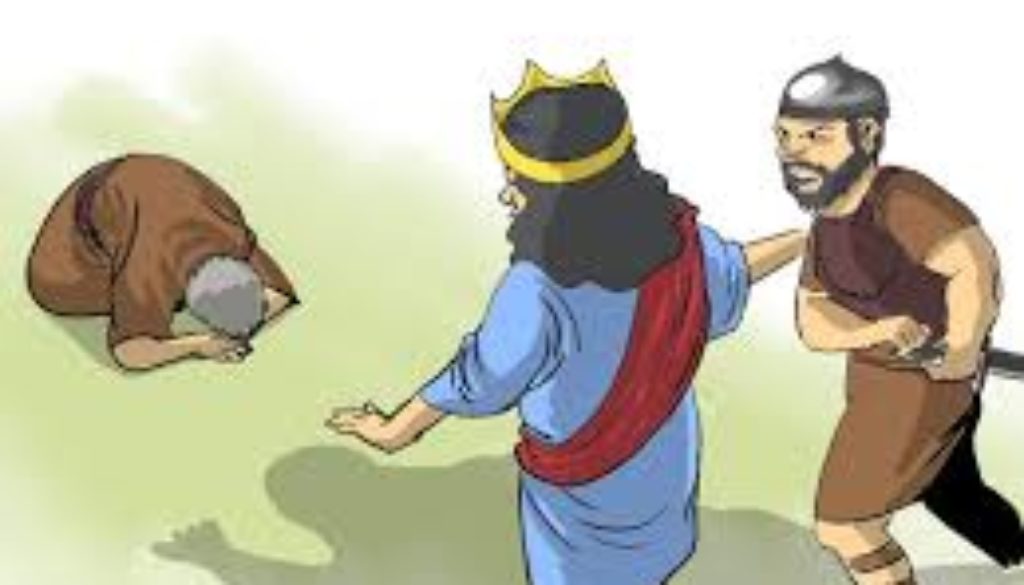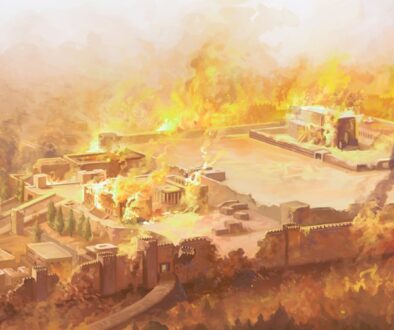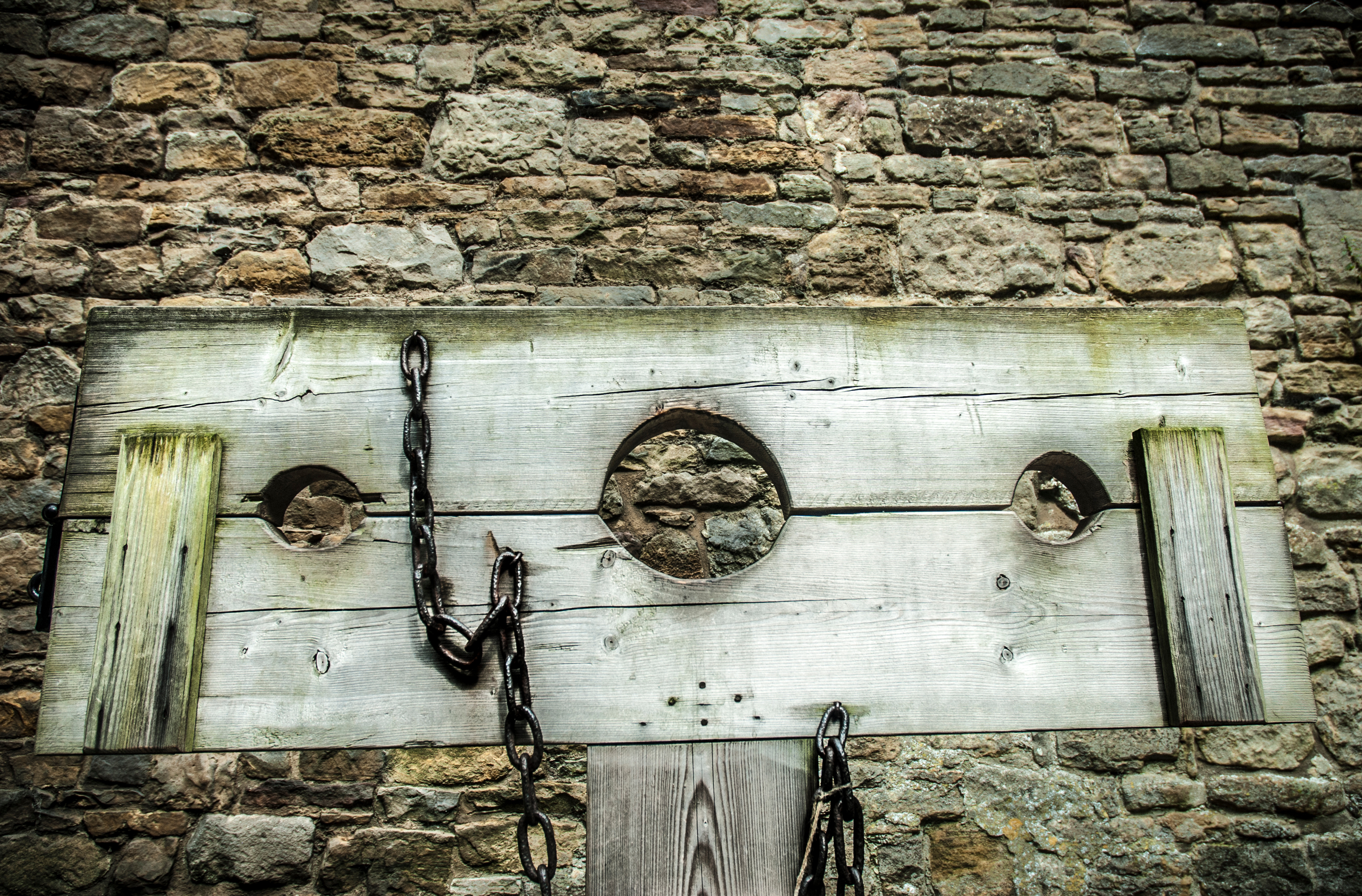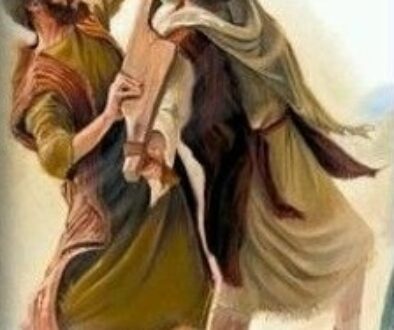2 Samuel 19:16-43 Return Trip
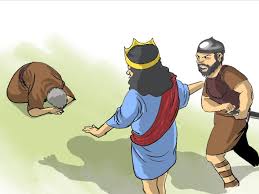
The time has come for David to return to Jerusalem. Absalom has been defeated and the tribe of Judah have come to bring him back to Jerusalem. Several issues get addressed along the way.
Looking at today’s reading and Mephibosheth’s state it seems like David was missing from Jerusalem for days or weeks, not months or years. Mephibosheth “had neither taken care of his feet nor trimmed his beard nor washed his clothes, from the day the king departed until the day he came back in safety” (verse 24b).
David’s interaction with Mephibosheth was not the first thing that happened on this eventful journey. Let’s rejoin our story and walk home with David. I want to back up to the point we left off a few days ago. We left David after he returned to the gate to congratulate his men. Joab had to tell him to get hold of himself or he would lose all of them.
♥ ♦ ♥
David takes his seat once again in the gate. His face is composed even if his heart isn’t. He still feels Absalom’s death deeply but his men need his support right now. One by one and in small groups his men approach him and bow deeply. David smiles and offers blessings to each one. He is truly a king of the people. When the last blessing has been spoken David speaks to the whole group; “Let’s feast to our victory!”
A cheer rises up long and loud. This is a standard occurrence for the returning victors but David’s original mood had halted all thoughts of a celebration. Men quickly trade their armor for instruments, at least those who play do, and the women begin setting out tables of food.
David makes the opening invitation once everything is ready. “For this battle, the glory belongs first to the Lord. He gave us the strength and cunning to defeat the enemy. We will honor the loss of our brothers by reuniting Israel as soon as possible. Pray that day comes soon. As for now, let’s eat!”
The feast lasts well into the night. By morning, nothing remains except a few who have consumed too much wine and empty platters. It was a good celebration, filled with life.
As David’s men bow before him and feast, the Israelites who had followed Absalom reach their homes. They are discouraged. David’s forces were clearly outnumbered but they won. So many of Absalom’s army lay broken on the ground. This was a terrible state to leave their fallen in but there was no way to retrieve them without being killed too. Brothers, cousins, uncles, and even sons left behind.
On the road home discussion started as to ‘why’ David’s forces prevailed. “I have never seen such skilled fighters. David only trained his own mighty men with those battle skills.” “His fighting tactics of drawing us into that accursed forest are to blame. I thought none of us would make it out of there alive.”
Finally the true reason for David’s victory is voiced. “The Lord fought for him. He is still the king the Lord has chosen for us.” This revelation stopped all the groaning and complaining cold. The conversation then moved in another direction.
“What do we do then?”
“To start with, we repent.”
“But then what?”
“Then we take a hard look at our situation. We look at how we got here and what turned us against king David. Why we were so willing to follow Absalom.”
“But…”
“Not now, AFTER we have sought the Lord.”
That ended all conversation. Each man continued on to their own homes without another word.
Prayers of repentance and soul searching happened in every tribe in Israel over the next few days. Men met together informally to discuss their conclusions.
“David was a good king.”
“The king delivered us from the hand of our enemies and saved us from the hand of the Philistines, and now he has fled out of the land from Absalom. But Absalom, whom we anointed over us, is dead in battle” (verses 9b-10a).
“He is the Lord’s anointed. And that means more than anything else.”
“Now therefore why do you say nothing about bringing the king back?” (verse 10b).
“But would he be willing to do it? Will he punish all those who stood with Absalom? How many more lives will be lost because of our blindness? We were used by Absalom for his own selfish pleasures and we fell for his words of loyalty.”
“We need to at least try. There is little hope of pleasing the Lord without him on the throne again.”
This discussion and decision to seek David’s return is transpiring throughout all of Israel but no one is taking the initiative to do anything.
David is a humble king. He doesn’t force himself onto the people but this waiting is getting old! It has been days since the death of Absalom. Israel is without a leader. David has also heard rumors floating around about many of the people wanting to reinstall him as king. This sentiment seems to be coming from everywhere, including Judah. The tribe of Judah was the one he holds most responsible for Absalom’s contention for the throne because it was in Hebron that Absalom was anointed king by the people. It could not have happened inside their borders without their consent.
David lets that issue rest. It will do him little good to anger the people by pointing fingers. But since Judah is his tribe he will appeal to them to be first again. They were the first to anoint him as king after Saul’s death. And they did so because of his connection to them and his deeds on their behalf. Those two foundational truths have not changed. It is time to remind Judah of this.
David will not bring this request to them personally for safety and propriety reasons. If there are those in Judah who would resist his return they would be very happy to have a chance to do away with him if he were to appear before them in person. The request also should go through the high priest as God was the one who ordained him as king to begin with.
To spur Judah into action David plans out carefully what to say. He then calls Jonathan and Ahimaaz to take a message to Zadok and Abiathar. He hands them a parchment sealed with his signet ring. “Take this to the priests, Zadok and Abiathar. They will know what to do from there.”
Jonathan and Ahimaaz are pleased to be of service to David again. They quickly make their way back to Jerusalem. It is much easier going this time since they don’t have to be warry of Absalom’s guards. They quickly deliver their message and wait to see if there is a reply.
Zadok reads the parchment. “The king has asked us to appeal to the leaders of Judah on his behalf. He asks them to be the first to bring him back as king. I think that is a very good plan.”
“What would he have us say?”
“Let me read you his words. ‘Say to the elders of Judah, “Why should you be the last to bring the king back to his house, when the word of all Israel has come to the king? You are my brothers; you are my bone and my flesh. Why then should you be the last to bring back the king?” And say to Amasa, “Ae you not my bone and my flesh? God do so to me and more also, if you are not commander of my army from now on in the place of Joab”’ (verses 11b-13).
“So David appeals on the ground of kinship and priority. It is interesting that he displaces Joab with Amasa. What do you think the reason for this is?”
“It may be that there has been trouble between the king and Joab. It may also be that Amasa was the commander of Israel’s army in Joab’s absence king wants him to know that he will retain that post. He would essentially be rejoining the two forces as one.”
“A VERY good idea!”
The next day Zadok and Abiathar present David’s case to the leaders of Judah. The tribe of Judah were all in agreement with bringing David back. They sent a message back to him through Jonathan and Ahimaaz. “Return, both you and all your servants” were the words sent to David.
David was overjoyed to receive the good reply. He prepared his household immediately for the return trip. While David prepared his company the tribe of Judah did more. They sent a contingent of their own to meet David at Gilgal. They would personally escort David across the Jordan and back to Jerusalem.
The first rays of dawn find David and his contingent ready to begin their journey. The air is charged with excitement. The return journey is joyful as they are going home.
As they made their way from Mahanaim they were escorted by Barzillai and his son Chimham. He was one of the three men who had sent supplies to David when he first arrived. Barzillai had provided well for David’s needs while he was in Mahanaim. Now he was seeing David safely home.
Several hours passed as the procession made their way to the Jordan crossing. When they came to Abel-shittim they prepared for the crossing. Gilgal was just the other side of the river. There waited the men of Judah and Shimei with 1,000 men of the tribe of Benjamin. Before David’s company could even begin the process of loading the barges the many of the men of Judah moved toward him. With the men of Judah came also Shimei and Ziba with his fifteen sons and his twenty servants. These men crossed over to David to assist his family on their return crossing.
Shimei had the distinction of being the man who cursed David all the way from Bahurim to the Jordan on his way out. He is the first to reach David when the barges reach the eastern shore. He falls at David’s feet. He is here to plead for forgiveness.
From his position on the ground Shimei speaks; “Let not my lord hold me guilty or remember how your servant did wrong on the day my lord the king left Jerusalem. Do not let the king take it to heart. For your servant knows that I have sinned. Therefore, behold, I have come this day, the first of all the house of Joseph to come down to meet my lord the king” (verses 19b-20).
Abishai has been watching Shimei’s display with contempt. He speaks to David once Shimei’s pleas have ceased. “Shall not Shimei be put to death for this, because he cursed the Lord’s anointed?” (verse 21).
David looks to Abishai and shakes his head. “What is it with Joab and Abishai” thinks David. “They always seem to be out for blood.” His answer to Abishai is laced with enough rebuke to sting and also assert David’s own authority. “What have I to do with you, you sons of Zeruiah, that you should this day be an adversary to me? Shall anyone be put to death in Israel this day? For do I not know that I am this day king over Israel?”
Abishai lowers his head and steps back from David. David turns his attention back to Shimei. “You shall not die” (verse 23b). This was David’s oath to the man. David would not kill him for his sin.
The men of Judah and Ziba helped David’s family to cross the Jordan. The size of David’s group meant that it took several hours to complete this process. As David was the last one out of Jerusalem he wants to be the last one across the Jordan. He will see his people safely on the other side before he crosses over.
Before David crosses over he turns to Barzillai. He has been blessed by this man’s generosity and loyalty. These are things David will never forget and longs to repay. “Come over with me and I will provide for you with me in Jerusalem” (verse 33b) entreats David.
Barzillai is touched by David’s offer of loyalty but he declines. He is old and has no use for the gifts that David is offering. “How many hears have I still to live, that I should go up with the king to Jerusalem? I am this day eighty years old. Can I discern what is pleasant and what is not? Can your servant taste what he eats or what he drinks? Can I still listen to the voice of singing men and singing women? Why then should your servant be an added burden to my lord the king? Your servant will go a little way over the Jordan with the king. Why should the king repay me with such a reward? Please let your servant return, that I may die in my own city near the grave of my father and my mother. But here is your servant Chimham. Let him go over with my lord the king, and do for him whatever seems good to you” (verses 34b-37).
David smiles at Barzillai. He is indeed a humble man. “Chimham shall go over with me, and I will do for him whatever seems good to you, and all that you desire of me I will do for you” (verse 38, emphasis added by me).
All three men board the last barge and cross the Jordan together. Once they reach the other side, David kissed Barzillai and blessed him. Barzillai took the barge back across the Jordan and watched from the banks as David and Chimham rejoined the group making their way back to Jerusalem. Barzillai would likely not see his son again but his future was secure. More secure that even his vast wealth could buy.
As Barzillai and David are saying their final good-bye’s there is another preparing for a new ‘hello’. That person is Jonathan’s son Mephibosheth. He cannot travel all the way to Gilgal because of his crippled feet. But he wants to be one of the first to welcome David back home. He has been in near mourning since David left. He wanted to go with him but his servant tricked him. As a sign of solidarity he has not cared for his feet, clipped his beard or even washed his clothes since the day David left. He longs for David’s return and will ensure David knows this.
Back in Gilgal the men of Judah regroup David’s people and prepare to be their escort and guard, if need be, the rest of the way to Jerusalem. Before even making it out of sight of the city they are met by men from every tribe in Israel. They wanted to bring the king back. Their plan was to do so as a whole nation but the tribe of Judah acted on this desire before the rest of the people.
They are angry and they take their grievances to the king. “Why have our brothers the men of Judah stolen you away and brought the king and his household over the Jordan, and all David’s men with him?” (verse 41b).
Before David can even answer the men of Judah speak. “Because he is our close relative. Why then are you angry over this matter? Have we eaten at all at the king’s expense? Or has he given us any gifts?” (verse 42b).
No longer are the men of Israel speaking to David but directing their accusations to the men of Judah directly. “We have ten shares in the king, and in David also we have more than you. Why then did you despise us? Were we not the first to speak of bringing back our king?” (verse 43b).
David watches as the men square off. He could tell them that he sent word to Judah to have them be the first but he wonders how that would look. For now he holds his tongue.
From the crowd of men comes the sound of a trumpet. It calls everyone to attention.
(to be continued)
♥ ♦ ♥
I find it interesting that Shimei didn’t tell David he was sorry, only that he sinned. He asked David to ‘forget the whole thing’. I have a feeling he made this plea in haste to appease David. He acknowledged what he did was wrong before God and David. He rushes to be the first to welcome David back when he was the last to send him off. A full 180 degree turn.
God can and often does author those types of turns in our lives. Not a partial turning but a full walking away from what came before. His salvation is that same kind of turn. A turning from death to life. This turn is immediate and complete in the spiritual realm but it gets walked out in incremental degrees, sometimes repeatedly going over those same ‘degrees.
I feel for Mephibosheth. He was left stranded and then lied about. I’m holding the portion of his story out until David reaches Jerusalem because this is where the two meet up again. I wanted to keep my story timeline structured. I trust that is alright with the rest of you. If not, I’m sorry for any confusion I may be introducing. I trust God to work all that out.
Father God, thank You for Your forgiveness. Thank You for authoring my ‘turn’ from death to life. THANK YOU for anchoring my soul in the ‘full turn position’ instead of letting me flop back and forth like a lose sail. Thank You that each day brings me one day, and one lesson, closer to completing that FULL turn in my physical life. I know I still have a LONG way to go. Thank You for pardoning me.

